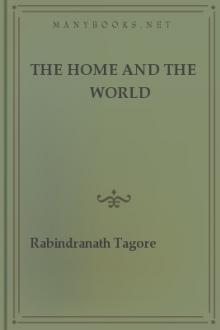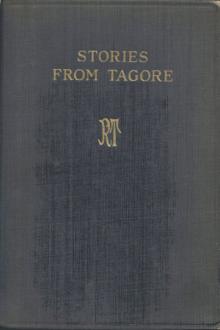The Home and the World - Rabindranath Tagore (books to read in your 30s .txt) 📗

- Author: Rabindranath Tagore
- Performer: -
Book online «The Home and the World - Rabindranath Tagore (books to read in your 30s .txt) 📗». Author Rabindranath Tagore
"What a terrible thing, brother," exclaimed the Bara Rani.
"Whatever shall we do?"
I made light of the matter to reassure her. "We still have
something left," I said with a smile. "We shall manage to get
along somehow."
"Don't joke about it, brother dear. Why are they all so angry
with you? Can't you humour them? Why put everybody out?"
"I cannot let the country go to rack and ruin, even if that would
please everybody."
"That was a shocking thing they did at the burning-grounds. It's
a horrid shame to treat you so. The Chota Rani has got rid of
all her fears by dint of the Englishwoman's teaching, but as for
me, I had to send for the priest to avert the omen before I could
get any peace of mind. For my sake, dear, do get away to
Calcutta. I tremble to think what they may do, if you stay on
here."
My sister-in-law's genuine anxiety touched me deeply.
"And, brother," she went on, "did I not warn you, it was not well
to keep so much money in your room? They might get wind of it
any day. It is not the money--but who knows..."
To calm her I promised to remove the money to the treasury at
once, and then get it away to Calcutta with the first escort
going. We went together to my bedroom. The dressing-room door
was shut. When I knocked, Bimala called out: "I am dressing."
"I wonder at the Chota Rani," exclaimed my sister-in-law,
"dressing so early in the day! One of their Bande Mataram
meetings, I suppose. Robber Queen!" she called out in jest to
Bimala. "Are you counting your spoils inside?"
"I will attend to the money a little later," I said, as I came
away to my office room outside.
I found the Police Inspector waiting for me. "Any trace of the
dacoits?" I asked.
"I have my suspicions."
"On whom?"
"Kasim, the guard."
"Kasim? But was he not wounded?"
"A mere nothing. A flesh wound on the leg. Probably self-
inflicted."
"But I cannot bring myself to believe it. He is such a trusted
servant."
"You may have trusted him, but that does not prevent his being a
thief. Have I not seen men trusted for twenty years together,
suddenly developing..."
"Even if it were so, I could not send him to gaol. But why
should he have left the rest of the money lying about?"
"To put us off the scent. Whatever you may say, Maharaja, he
must be an old hand at the game. He mounts guard during his
watch, right enough, but I feel sure he has a finger in all the
dacoities going on in the neighbourhood."
With this the Inspector proceeded to recount the various methods
by which it was possible to be concerned in a dacoity twenty or
thirty miles away, and yet be back in time for duty.
"Have you brought Kasim here?" I asked.
"No," was the reply, "he is in the lock-up. The Magistrate is
due for the investigation."
"I want to see him," I said.
When I went to his cell he fell at my feet, weeping. "In God's
name," he said, "I swear I did not do this thing."
"I do not doubt you, Kasim," I assured him. "Fear nothing. They
can do nothing to you, if you are innocent."
Kasim, however, was unable to give a coherent account of the
incident. He was obviously exaggerating. Four or five hundred
men, big guns, numberless swords, figured in his narrative. It
must have been either his disturbed state of mind or a desire to
account for his easy defeat. He would have it that this was
Harish Kundu's doing; he was even sure he had heard the voice of
Ekram, the head retainer of the Kundus.
"Look here, Kasim," I had to warn him, "don't you be dragging
other people in with your stories. You are not called upon to
make out a case against Harish Kundu, or anybody else."
XIV
On returning home I asked my master to come over. He shook his
head gravely. "I see no good in this," said he--"this setting
aside of conscience and putting the country in its place. All
the sins of the country will now break out, hideous and
unashamed."
"Who do you think could have ..."
"Don't ask me. But sin is rampant. Send them all away, right
away from here."
"I have given them one more day. They will be leaving the day
after tomorrow."
"And another thing. Take Bimala away to Calcutta. She is
getting too narrow a view of the outside world from here, she
cannot see men and things in their true proportions. Let her see
the world--men and their work--give her abroad vision."
"That is exactly what I was thinking."
"Well, don't make any delay about it. I tell you, Nikhil, man's
history has to be built by the united effort of all the races in
the world, and therefore this selling of conscience for political
reasons--this making a fetish of one's country, won't do. I know
that Europe does not at heart admit this, but there she has not
the right to pose as our teacher. Men who die for the truth
become immortal: and, if a whole people can die for the truth, it
will also achieve immortality in the history of humanity. Here,
in this land of India, amid the mocking laughter of Satan
piercing the sky, may the feeling for this truth become real!
What a terrible epidemic of sin has been brought into our country
from foreign lands..."
The whole day passed in the turmoil of investigation. I was
tired out when I retired for the night. I left over sending my
sister-in-law's money to the treasury till next morning.
I woke up from my sleep at dead of night. The room was dark. I
thought I heard a moaning somewhere. Somebody must have been
crying. Sounds of sobbing came heavy with tears like fitful
gusts of wind in the rainy night. It seemed to me that the cry
rose from the heart of my room itself. I was alone. For some
days Bimala had her bed in another room adjoining mine. I rose
up and when I went out I found her in the balcony lying prone
upon her face on the bare floor.
This is something that cannot be written in words. He only knows
it who sits in the bosom of the world and receives all its pangs
in His own heart. The sky is dumb, the stars are mute, the night
is still, and in the midst of it all that one sleepless cry!
We give these sufferings names, bad or good, according to the
classifications of the books, but this agony which is welling up
from a torn heart, pouring into the fathomless dark, has it any
name? When in that midnight, standing under the silent stars, I
looked upon that figure, my mind was struck with awe, and I said
to myself: "Who am Ito judge her?" O life, O death, O God of the
infinite existence, I bow my head in silence to the mystery which
is in you.
Once I thought I should turn back. But I could not. I sat down
on the ground near Bimala and placed my hand on her head. At the
first touch her whole body seemed to stiffen, but the next moment
the hardness gave way, and the tears burst out. I gently passed
my fingers over her forehead. Suddenly her hands groping for my
feet grasped them and drew them to herself, pressing them against
her breast with such force that I thought her heart would break.
Bimala's Story
XVIII
Amulya is due to return from Calcutta this morning. I told the
servants to let me know as soon as he arrived, but could not keep
still. At last I went outside to await him in the sitting-room.
When I sent him off to sell the jewels I must have been thinking
only of myself. It never even crossed my mind that so young a
boy, trying to sell such valuable jewellery, would at once be
suspected. So helpless are we women, we needs must place on
others the burden of our danger. When we go to our death we drag
down those who are about us.
I had said with pride that I would save Amulya--as if she who was
drowning could save others. But instead of saving him, I have
sent him to his doom. My little brother, such a sister have I
been to you that Death must have smiled on that Brothers' Day
when I gave you my blessing--I, who wander distracted with the
burden of my own evil-doing.
I feel today that man is at times attacked with evil as with the
plague. Some germ finds its way in from somewhere, and then in
the space of one night Death stalks in. Why cannot the stricken
one be kept far away from the rest of the world? I, at least,
have realized how terrible is the contagion--like a fiery torch
which burns that it may set the world on fire.
It struck nine. I could not get rid of the idea that Amulya was
in trouble, that he had fallen into the clutches of the police.
There must be great excitement in the Police Office--whose are
the jewels?--where did he get them? And in the end I shall have
to furnish the answer, in public, before all the world.
What is that answer to be? Your day has come at last, Bara Rani,
you whom I have so long despised. You, in the shape of the
public, the world, will have your revenge. O God, save me this
time, and I will cast all my pride at my sister-in-law's feet.
I could bear it no longer. I went straight to the Bara Rani.
She was in the verandah, spicing her betel leaves, Thako at her
side. The sight of Thako made me shrink back for a moment, but I
overcame all hesitation, and making a low obeisance I took the
dust of my elder sister-in-law's feet.
"Bless my soul, Chota Rani," she exclaimed, "what has come upon
you? Why this sudden reverence?"
"It is my birthday, sister," said I. "I have caused you pain.
Give me your blessing today that I may never do so again. My
mind is so small." I repeated my obeisance and left her
hurriedly, but she called me back.
"You never before told me that this was your birthday, Chotie
darling! Be sure to come and have lunch with me this afternoon.
You positively must."
O God, let it really be my birthday today. Can I not be born
over again? Cleanse me, my God, and purify me and give me one
more trial!
I went again to the sitting-room to find Sandip there. A feeling
of disgust seemed to poison my very blood. The face of his,
which I saw in the morning light, had nothing of the magic
radiance of genius.
"Will you leave the room," I blurted out.
Sandip smiled. "Since Amulya is not here," he remarked, "I
should think my turn had come for a special talk."
My fate was





Comments (0)